Text
Robby probably struggles with his position of power because it was thrust upon him when Adamson died.
They probably joked that one day Robby would take Adamson’s job as Chief of Emergency Medicine. Robby was his protege, his shadow, his chosen son. But neither realized how soon that day would come.
In Robby’s mind, he only has the job because he was the only PMTC senior attending qualified for the position. He only had the job because the threat of an outside hire made the entire department uneasy. He only has the job because he killed couldn’t save Adamson.
Every time Gloria hunts him down to discuss metrics, every time the nurses ask him if their department is being sold, every time the residents look to him in chaos like he is omnipotent, Robby is reminded how unprepared he was and still is to be Chief of Emergency Medicine.
When Robby is walking home after his 15 hour shift in the aftermath of Pittfest, he can’t help but wonder what Adamson would have done differently. If Adamson could have saved Leah. If Adamson would have been proud of him.

487 notes
·
View notes
Text
while we're on the subject i think we need to talk about jack abbot's quiet panic when robby is on the roof. bc robby being in his spot is Not Normal and he's trying not to freak out. and yeah he does a great job keeping that shit under wraps bc he's literally trained to stay calm under pressure. but the alarmed look in his eye. the desperate way he jumps from comedic to heartfelt to argumentative, trying to find something, ANYTHING, that he can say to get robby to step away from that ledge. the way he leans against the railing, makes himself small. creates an intimate space that invites robby to open up to him, then demands unwavering eye contact while delivering affirmations. robby talking jack down is a given, almost routine. jack talking robby down is unthinkable, and he is terrified.
999 notes
·
View notes
Text
Noah Wyle is heading to Capitol Hill this week to advocate for health care workers. And let’s not forget he was arrested there in 2012 while protesting potential Medicaid cuts.

All “hot old man” jokes aside, this man is a remarkably good human being.
1K notes
·
View notes
Text
kingdon week 2025: day 1 - colors song: blue eyes by blueyes
48 notes
·
View notes
Text

stop talking
665 notes
·
View notes
Text


👩🏻⚕️🩺🧑⚕️ Hey guys, this is something new I'm working on!
Something a little bit more special.
I have a lot of doctors and nurses in my family, so I already had a good idea of what it's like right now in hospitals; but others might not have had an idea, not until The Pitt.
Due to the realistic nature of The Pitt, a lot of people got to get a real sense of what a lot of Healthcare workers are dealing with right now, to an extreme overwhelming sense.
And because hospitals are so full, understaffed, and overwhelmed right now; that can cause burnout in Healthcare workers and can even lead to suicide.
So I decided to work with kuku_karina on IG to get some designs out of our favorite doctors from The Pitt! I can't thank her enough for how on board she was with this idea, and she did a fantastic job as always!
I'll be making them into double sided keychains and most of the proceeds from the keychains (a little bit will go back towards what it cost to produce them) will go to the Dr. Lorna Breen Heroes’ Foundation whose mission it is to "reduce burnout of health care professionals and safeguard their well-being and job satisfaction. We envision a world where seeking mental health services is universally viewed as a sign of strength for health care professionals."
Burnout + Suicide prevention and awareness is important for everyone in general, but Healthcare workers can sometimes go overlooked. So I'm trying to bring some awareness and help out a bit! I hope you guys will be just as interested and eager to help! (:
If theres a doctor/nurse thats your favorite character from The Pitt that isn't up there, let me know; and if there's enough interest I can get a keychain made of them as well! I figured I would start with 4 characters; 2 male and 2 female, and go from there. If you have any questions, let me know! Thank you!👩🏻⚕️🩺🧑⚕️
13 notes
·
View notes
Text
except for breath, except for everything


mel king/frank langdon (the pitt) | explicit | 7K | 1/5 (WIP)
The cold—an absolute shock to the system, like a thousand little sewing needles pricking her skin—reverberates now, in the present, when the WTAE Breaking News notification hits her phone:
Pittsburgh Doctor Sentenced to Five Years in Drug Diversion and Theft Case
At 6:30 PM on a July evening, everyone in the city knew about Dr. Frank Langdon.
Additional Tags (For the Whole Fic): Incarceration; Epistolary; Non-Linear Narrative; Implied/Reference Drug Use; Substance Abuse; Post-Season/Series 01; Heavy Angst; Emotional Infidelity; Hurt/Comfort; Suicidal Thoughts; Explicit Sexual Content; Codependency; Loss of Virginity; it's a social construct but whatevs; Breeding Kink
#the pitt#mel king#frank langdon#so good#i think the rest of the fic will fuck me up#bad#like real bad
45 notes
·
View notes
Text
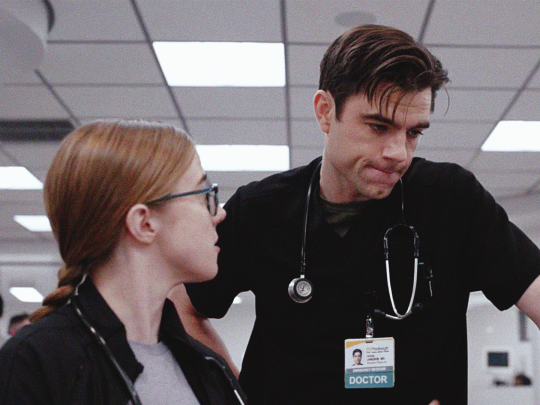
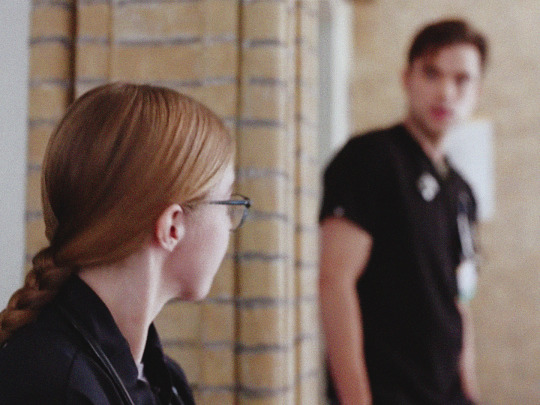
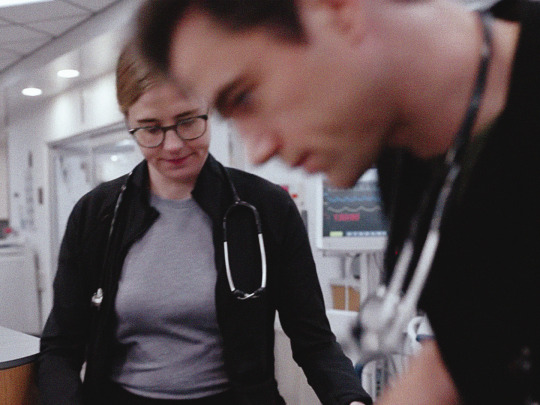
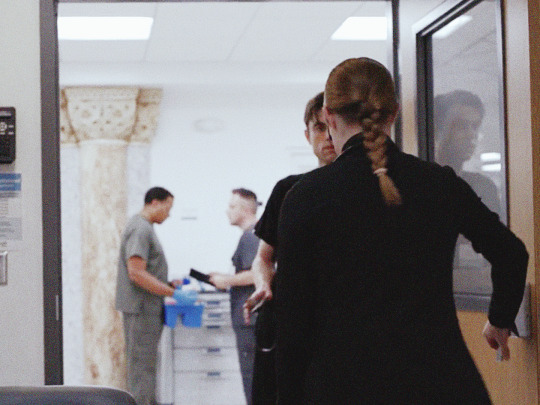
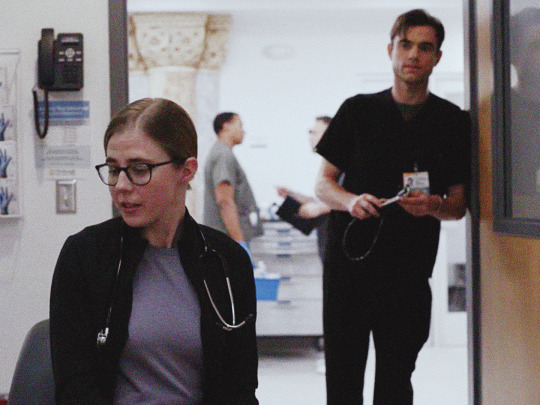
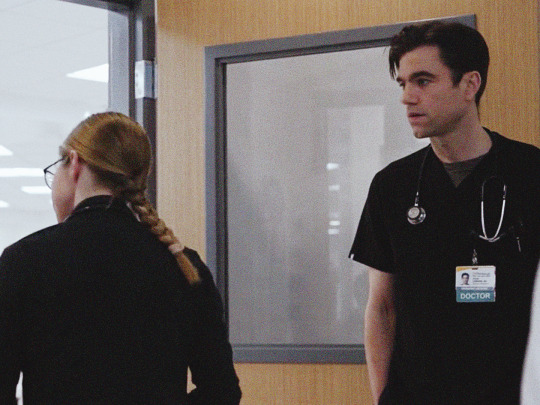
THE PITT 1.07 Mel&Langdon
388 notes
·
View notes
Text

mrs and mrs favouritism
88 notes
·
View notes
Text
The realism of Robby being a little bit of an unintentional misogynist is so, so important to me. Like he is a good boss and a great teacher, he is friends with women and works with women and teaches women and respects women greatly. And yet—it’s Langdon, and then Whitaker, who Robby adopts as his mentees. It’s David, not the girls on the kill list, who Robby prioritizes care for. It’s the dad accused of grooming his daughter who Robby refuses to report, while informing the authorities about the mother drugging him without a second thought. He reams Langdon out for berating Santos, but doesn’t check in on Santos until Langdon refuses to let it go and Robby becomes suspicious of there being an actual problem.
And obviously we are seeing Robby on the worst day of life, and maybe even calling him a “little bit of a misogynist” is a bit too much because he’s not, really. But he does have ingrained biases and he does seem to only be able to fully see himself in and completely empathize with other men. And that is just. So true of even the nicest, kindest, most wonderful and feminist men I know.
8K notes
·
View notes
Text
this took me forever & it’s too late at night to post on tiktok. here u go tumblr dot com 🫶
tiktok (to be posted soon): clementinestarss
131 notes
·
View notes
Text
let's be real, langdon's first and immediate priority when he's caught is to the control the narrative. he knows santos has him, so he tries to run her name through the mud, make her an unreliable reporter, but that doesn't work--robby listens to her anyway. he pivots to robby--robby has to listen to him, right? but he doesn't, he searched the locker anyway. but he's not an addict, could an addict save lives, could an addict do any of what he's accomplished in a given shift--in a given week? more control, more pushing. he goes to dana, another confidant, and tries again to control what gets out, control how others see him in that moment, and when that doesn't work he gets nasty, he lashes out at robby about his most vulnerable moment. and if that doesn't solidify him as a true addict then idk what show y'all were watching, just because langdon wasn't nodding off in public doesn't take away that he's still an addict, he's acting exactly like someone in active use does, and even if he doesn't realize it, he's definitely still impaired. thanks for listening to my ted talk.
344 notes
·
View notes
Text

from june 2nd to june 8th we are celebrating kingdon (mel king/frank langdon) and everything we love about them, individually and together ♡
you can participate by writing fics, making gifsets, editing videos, drawing fanart, creating playlists, posting meta,... basically anything and everything you can think of as long as it centers around mel and langdon, and their relationship to each other.
every day has two prompts that are meant to inspire and motivate creators. they are just guidelines and can be interpreted as literally or as loosely as you want. so have fun with them and be creative!
🩺 june 2nd: colors | love confession 🩺 june 3rd: scenes | canon continuation 🩺 june 4th: summer | vacation destination 🩺 june 5th: innovation | alternate universe 🩺 june 6th: love | forbidden romance 🩺 june 7th: minimalism | speculative fiction 🩺 june 8th: mixed media (or free choice)
you can use our hashtag #kingdonweek2025 to tag your creations and we'll be reblogging them all throughout the week.
if you have any questions, please look at our rules and faq page. if you still have comments or suggestions send us an ask. we'll get to it as quickly as we can.
we're so excited to share this week with you and to see what everyone creates.
235 notes
·
View notes
Text


















THE PITT -> Similarities between Dr. Trinity Santos and Dr. Frank Langdon
4K notes
·
View notes
Text








“The Pitt” characters + tumblr posts that are definitely about them part 1 (original posts: x, x, x, x, x, x, x, x) (part 2, 3, 4, 5)
7K notes
·
View notes
Note
Is jack a cat guy? Pls say yes but also I trust your interpretation of the character. What about Robby? He seems more dog guy but I’m no expert.
Okay, hear me out—I actually think it’s the opposite, and I’m weirdly passionate about this. Totally just my take, but still.

🐶 Jack Abbot is a dog guy. And not just any dog guy—he’s a mutt-with-a-history, limping-loyalty, broken-trust-and-bigger-heart kind of dog guy.
There’s a dog in Jack Abbot’s house, but you wouldn’t know it at first glance. No chew toys. No leash hanging crooked on a hook. No framed photo with a dumb caption. It’s not that kind of house. It’s clean in a way that feels deliberate—not sterile, just… considered. The kind of clean that belongs to a man who rebuilt this space with his own hands. Furniture that’s sturdy and dark-stained. Leather that wears its creases proudly. Walls the color of late-evening light. A record player he doesn’t admit he uses. The open shelving in the kitchen is all neat rows of mismatched mugs and glassware—none of it new, but all of it used. The military shadowbox sits on top of a bookshelf, not hung. His therapist asked him once if that was symbolic. Jack said, “It’s heavy. Didn’t want to drill into brick.”
He wasn’t lying.
And yet, despite all the order and the weight, there’s a dog. You’ll hear the shift of claws on hardwood before you see it. Big thing—tall and wide at the shoulders, mutt energy but German shepherd eyes. Dark-coated, pale around the snout like ash brushed across fur. It moves slowly, doesn’t come unless Jack calls. But when it does, it presses its whole weight against his thigh like it knows where the grief lives.
Jack named him Clyde. Just Clyde. One syllable, like a call sign or a whispered command. It suits him—solid, dependable, low to the ground. Jack doesn’t remember why he picked it. Maybe because it sounded like a guy who wouldn’t ask too many questions.
He found him in the snow behind a shuttered gas station three years ago. Pittsburgh had iced over. Jack was walking home from therapy—the kind of session where he said too much and didn’t feel better. He stopped when he saw the movement: this shaggy, frozen creature dragging its hind leg, too proud to whine. Most people would’ve kept walking. Jack crouched down, looked him in the eye, and said, “Yeah. Same.”
That was it.
Jack didn’t plan for the dog to stay. But when Clyde followed him home—limping, bleeding, silent—Jack didn’t stop him. He just opened the front door, pointed to the kitchen tile, and said, “You bleed there. Not on the rug.”
Clyde obeyed.
They’ve been coexisting ever since. Quiet. Predictable. Wordless in the best way.
Clyde doesn’t need anything Jack can’t give. He doesn’t ask for walks, but he’ll go when Jack grabs the leash. Doesn’t need affection, but will curl up under Jack’s desk while he reads through trauma case reports. He’s always near but never in the way. He’s what Jack wishes people were like—self-contained, loyal, able to read a room.
And Jack—he loves this dog. Not the way people talk about it on social media. Not loudly. Not with sweaters or treats shaped like bones. But in the way he knows which foot Clyde favors when it’s going to rain. In the way he keeps a heating pad under the couch blanket for Clyde’s hip. In the way he murmurs, “You good?” when he gets home at 4:30 a.m., exhausted and still vibrating from whatever chaos The Pitt coughed up that night.
And Clyde? Clyde just looks at him. Doesn’t wag, doesn’t bark. Just nods in that imperceptible way dogs sometimes do. Like: I’m still here. And so are you.
There’s a kind of ritual in the way Jack lives. Clyde fits into that ritual like breath between chest compressions. Morning—if Jack is off—starts with black coffee and Clyde’s pill in peanut butter. They sit on the porch when the sky is still pink at the edges, Jack’s prosthetic resting beside him on a wooden crate. Clyde lays at his side, chest rising slow, ears alert. Jack reads journals—trauma surgery updates, disaster preparedness papers, anything with data. The living room is a minefield of open pages, underlined notes, broken spines. But Clyde never knocks anything over. He moves around the chaos like he’s part of it.
And at night, when Jack can’t sleep—which is often—he paces the apartment in socks, running through the shift over and over in his head. What he missed. Who he lost. What he could’ve done better. Sometimes, Clyde follows him room to room. Other times, he stays on the couch, thumping his tail once. Like: You’re spiraling again. I’ll be here when you stop.
Jack never says thank you. Not out loud. Not in the clean, linear way people expect. Gratitude doesn’t come easily to him—it catches somewhere between the diaphragm and the throat, too heavy to force out and too sacred to cheapen. But sometimes—on the worst nights, the ones that don’t feel like nights at all, just liminal stretches of exhaustion with no edge to fall off—he finds himself on the floor.
He’s still in scrubs. Collar wrinkled, sleeves pushed up unevenly, the fabric stiff with sweat and something darker. His hands carry the day—still sharp with the bite of antiseptic, the faint chalk of powdered gloves clinging to the creases. His wrists are raw from repeated scrubbing, the skin flushed and tight. Under his nails: a rust-colored rim of dried blood he couldn’t bring himself to finish cleaning off.
Sometimes it’s a kid. Sometimes it’s a man with the same eyes as someone he dragged into a medevac twelve years ago. Doesn’t matter. It always hits in the same place—low, silent, marrow-deep. And there’s never anywhere to set it down.
So he kneels. Not dramatically. Slowly. Mechanically. Like his joints are remembering a movement they haven’t made in years. He rests one hand on Clyde’s shoulder, the other braced on his own knee to keep from tipping forward. Clyde doesn’t flinch. Doesn’t lift his head. Just watches him with those slow, tired eyes, like he’s been waiting for this part of the evening.
Jack leans in. Forehead to fur, cheek grazing the dog’s ribcage. The pressure is grounding. Clyde smells like pine bark and sleep. Jack closes his eyes. Breathes in. Doesn’t say anything for a long while.
And then, low. So low it sounds like a confession:
“You make this bearable,” he mutters, the words scraped raw, like they cost something.
There’s a pause, a shift of air.
“You—just you.”
His voice cracks halfway through the sentence, but he finishes it anyway. That’s the kind of man he is—too stubborn to quit halfway, even when he’s breaking.
Clyde doesn’t move. Just breathes. Just stays.
Sometimes people ask, casually, between cases or during the lull of a shift, if he’s ever thought about getting a second dog. Someone saw a shepherd mix at the shelter. Someone else jokes that Clyde looks like he needs a friend.
Jack just shrugs, wipes his hands on a paper towel, and says, “One’s enough. Two’s a pack. Packs break down.”
He never smiles when he says it. And no one ever pushes.
Because it’s not a joke.
There’s no nostalgia in his voice. No warmth. Just flat pragmatism—like someone remembering how it feels when a convoy gets ambushed or a team leader doesn’t come back from the second sweep. Jack doesn’t do redundancies. Doesn’t invite variables. He has Clyde. And that is enough. That is the point.
Once, Dana tossed it at him playfully—on a long night when a kid coded twice and they got him back both times. “You’re softer than you act, Abbot,” she’d said, eyeing the way he folded a blanket under a patient’s neck without thinking.
Jack snorted. “Don’t tell the dog. He’ll lose respect.”
But he was lying.
Because Clyde already knows.
Has known from the first night, when Jack came home too quiet and sat on the floor without taking his coat off. When he muttered something like “You can go if you want” into the stillness and Clyde simply laid his head in Jack’s lap like he hadn’t even heard it.
Clyde knows everything. The limping cadence of Jack’s gait when the socket’s rubbing too hard. The difference between his angry silence and his hollowed-out kind. He knows when to leave the room, when to nudge his snout beneath Jack’s palm, when to lie still beside the prosthetic like he’s standing guard over something more than metal.
Because animals, in lives like this, aren’t just background. They’re not props. They’re not plot points. They are something else entirely. Something older. Elemental. They become the version of you that survives.
Clyde is that version of Jack. The part that’s allowed to exhale. The part that isn’t a trauma doctor or a soldier or a story people whisper about. The part that doesn’t need to earn his place in a room. The part that just is.
And Clyde stays with that part.
No matter how long the night is. No matter what Jack comes home carrying. No matter how many hours he spends sitting on the edge of the bed, elbow on his knee, staring at the dark like it’s daring him to move.
Clyde stays.
And Jack doesn’t thank him.
But every time he comes through the door and sees that dog lift his head—steady, quiet, still there—he thinks, maybe this is what love looks like when you finally stop trying to deserve it.
🐈 Michael Robinavitch is a cat guy. Not because he acts like one—but because he’s spent his whole life being misunderstood. Just like a cat.
He signs the adoption paperwork with the same pen he uses for time-of-death notes. Black ink. Thin barrel. Clicks it twice before putting it back in the chest pocket of his coat, even though he’s not cold. Not yet.
The shelter’s too warm. Fluorescent. Smells like antiseptic and pine-scented ammonia—the kind they used in old trauma bays before they phased out bleach. The girl behind the counter is chewing on a pencil and trying to make conversation, asking if he’s ever had a cat before. Robby just nods once. He’s not interested in a backstory. Or a narrative arc. Or the kind of sentimental bullshit that makes people cry in animal commercials.
He’s not here for company. He’s here for infrastructure.
The cat in question is six years old, dark grey, narrow-bodied, one white paw like a misprint. Her eyes are amber and faintly bored. She’s been in the shelter for eight months. Returned twice. The staff uses the word “selective.” Robby respects that.
He’d asked for “the one who doesn’t need anything.”
They brought her out in a carrier with a note paperclipped to the top: Independent. Doesn’t like loud noises. Not food-motivated. Will scratch if cornered.
He read it and said, “Sounds like an ex of mine.”
The girl didn’t laugh.
Good.
He didn’t tell anyone about her. He doesn’t tell people when he refills his Lexapro. He doesn’t tell them about the chipped mug he keeps on top of his microwave because it was Adamson’s. He doesn’t tell them why he left the memorial lunch Shelby brought in the fridge until someone else threw it away.
That day he went home and couldn’t sit down. Stood in his kitchen. Opened a beer. Didn’t drink it. Just stared at the condensation running down the neck like the bottle was trying to sweat something out.
He’d been doing everything right. Getting up. Going in. Holding it together like a man with no other option. But that day—the anniversary—hit different. He kept thinking about the moment he didn’t see coming. The sound Adamson made when he dropped. The awful nothingness of a man who had once known everything.
He stood there for an hour.
Then he grabbed his keys, still in scrubs, and drove across town to the shelter like it was a procedure he needed to perform.
He doesn’t name her.
Not in the way people mean. There’s a name on the vet paperwork—something the receptionist made him pick, something functional so they’d stop asking. But he doesn’t say it out loud. She doesn’t respond to it anyway.
Around the apartment she’s just “hey” or “alright” or “Jesus Christ” when she knocks over a pile of post-it notes and blinks at him like do better.
Sometimes, when he’s on the phone and she climbs up onto the back of the couch, he calls her “the auditor.”
It fits.
She doesn’t come to the door when he gets home. She doesn’t whine. Doesn’t wait for him. Some days she’s asleep under the radiator. Other days she’s perched on top of the fridge like a gargoyle. She doesn’t move unless she has something to say, and when she does, it’s usually a single unimpressed chirp that sounds vaguely judgmental.
He doesn’t mind.
He talks to her sometimes, in the same way he talks to the broken vending machine on Sublevel 1. Half under his breath. Half like he’s testing whether the silence will give anything back.
“Dropped a line in a central today,” he’ll mutter, tossing his keys into the bowl by the door. “Kid coded anyway. Too much fluid. Too late.”
The cat flicks her tail. Doesn’t even look up.
Robby exhales through his nose. “Don’t look at me like you could’ve done better.”
She lives in the corners of his life, not the center of it.
Her food bowl is stainless steel. No patterns. No mat. He refills it when it’s empty, not before. Keeps the kibble in a plastic bin on top of the fridge. Litter box in the bathroom closet, tucked next to the old mop and a three-pack of backup stethoscopes he never uses. He opens the blinds in the living room most mornings just enough to let in the sun for her to sleep in. Not because he thinks she needs it. But because she’s used to it now.
And that’s the key: not affection, not codependence—just expectation. Quiet consistency.
She’s not a comfort. She’s a constant.
The night he breaks down, she doesn’t move.
He’s on the floor again. Different reason this time—some kid he couldn’t get back, brain bleed, no family, no name in the system. Something about the paperwork triggered a spiral. He ended up in the hallway between his kitchen and the bathroom, slouched against the wall like a man on the edge of admitting something.
She sits across from him, just out of reach. Watching. Like she’s got him under observation. Not for emotional distress—just for data collection.
He doesn’t speak.
She doesn’t blink.
Eventually, he says, “You know he asked me—before they pulled the tube—if I thought it was going to hurt.”
A pause. A long one.
“I said no.”
The cat tilts her head slightly. Not disbelief. Not pity. Just... a record being updated.
He keeps going.
“I think I lied.”
She doesn’t move toward him. Doesn’t press her head into his palm. Doesn’t make it cinematic.
But she stays.
Dana comes over once, weeks later, dropping off a casserole from someone’s aunt or ex-husband or whoever made the mistake of asking if Robby “ever eats.” The cat appears halfway through the conversation, arches her back on top of the bookshelf, and stares directly into Dana’s soul.
Dana stares back. “That thing’s judging me harder than Gloria ever has.”
Robby shrugs. “She’s not wrong.”
“She’s judging your life choices.”
“She hasn’t left yet.”
“Yeah, but does she like you?”
He glances at the cat. “That’d be a first.”
The cat sneezes.
Dana snorts. “Jesus. Alright, fine.”
Robby doesn’t need her to love him. That’s not the deal.
She isn’t a metaphor for healing. She’s not some soft little redemption arc purring in his lap. She’s a presence. A demand. A subtle recalibration of what it means to share space. She takes up air and sound and physical territory and makes him acknowledge it.
She forces him to keep the blinds open. To buy batteries for the smoke detector. To get home on time. Because if he’s late, she dumps the water bowl over and drags the bathmat into the hallway like she’s staging a protest.
She doesn’t need him. She just expects him.
And Robby—haunted, functional, stubborn to the end—finds himself meeting that expectation.
Not because he has to.
Because he chose to.
And because she, unlike most people in his life, chose him back. Quietly. Permanently. Without ever asking for proof.
#the pitt#jack abbot#michael robinavitch#cat and dog people#day and night shifts#they're opposites your honor so the ship comes so easily
303 notes
·
View notes





